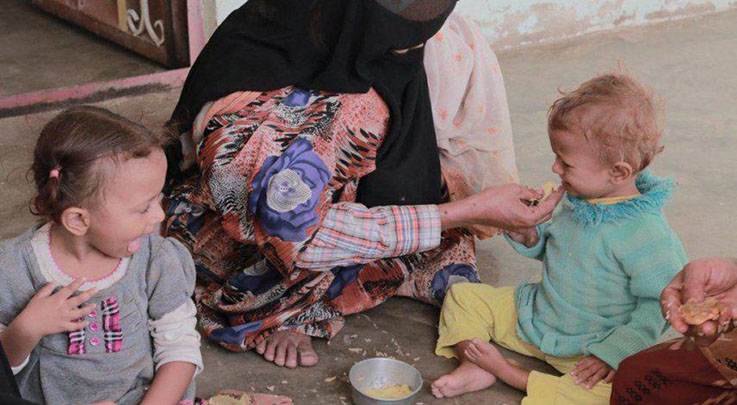Group of Eminent Experts: Siege on Yemen Contravenes Law, Creates Largest Humanitarian Crisis in the World
The UN Group of Eminent Experts on Yemen confirmed that the economic and military siege imposed on Yemen by the coalition had devastating effects and produced the world’s largest humanitarian crisis.
The recent report of the Group of Eminent Experts showed that access restrictions imposed by the coalition, such as the naval blockade and the closure of Sana’a International Airport, both contributed significantly to the deterioration of the Yemeni economy and reinforced the current humanitarian crisis, including increased Obstructing the delivery of relief supplies.
The report pointed out that in 2015, the coalition imposed restrictions on access to Yemeni territorial waters, which amount to the actual maritime blockade, where each vessel needs to enter the Yemeni waters after inspection of the coalition’s evacuation and humanitarian operations committee. Then in May 2016, the United Nations Verification and Inspection Mechanism for Yemen was established.
According to experts, the UN Verification and Inspection Mechanism is responsible for clearing merchant ships seeking to enter Yemen through ports under the authority of the Supreme Political Council.
The report pointed out that these measures led to a significant slowdown in the entry of goods to Yemen, increasing the cost and having a devastating impact on the economy, which depends mainly on imports, as evidenced by the fact that the amount of imports has already dropped dramatically.
Experts pointed out that the gradual restrictions that led to the complete closure of Sana’a airport and the suspension of commercial flights in August 2016, significantly affected the movement of people to and from Yemen, and had a significant impact on the rights of those in need of health care abroad.
“In November 2017, the coalition imposed a three-week blockade of Yemen, where Saudi Arabia announced the closure of all air, sea and land ports in Yemen, effectively detaining 27 million people, seizing 500,000 metric tons of food and fuel and 1,476 metric tons of aid,” experts said.
“After 10 days, Aden airport and seaport, along with the ports of Mukha, Mukalla and the land crossing with Saudi Arabia in Al-Wadeeah, were reopened, and the coalition ordered that all imports be re-routed through these ports, then on 23 November 2017, the ports of Hodeidah and Salif reopened to provide limited humanitarian assistance,” the report said.
“Given that about 80% of all Yemen’s imports flow through the ports of Hodeidah and Salif, around two thirds of Yemen’s population live in areas directly served by Sana’a airport, the continued closure of ports places an enormous burden on the availability of food in the market. It dramatically increases the risk of widespread famine in Yemen,” it added.
The report confirmed that the closure actually exacerbated the crisis dramatically, noting that restrictions on food, fuel and commercial revenues have exacerbated food insecurity as well as significantly weakening the Yemeni economy.
Delays and conversion of fuel tanks have had an impact not only on the economy, but also on agriculture and health, as fuel is needed to power hospital generators, pump water to homes and irrigate, the report said.
“While the blockade has been gradually eased, some restrictions in November 2017 remain in place to the time of this report, for example, Hodeidah Port remained closed to shipping containers (except for one case in 2018), ” the report said.
The Group of Experts expressed concern at recent reports that the forces of aggression are blocking access to the city of Ad-Durayhimi in Hodeidah governorate.
The report pointed out that the Group of Experts had not been able to determine the exact number of individuals still living in the areas of Ad-Durayhimi, therefore the specific needs of their populations. The lack of access by humanitarian actors for an independent assessment of the situation was also a problem.
The report stressed that the access restrictions of the blockade and other measures taken by coalition forces as well as the military blockade conditions have significantly impeded humanitarian operations, limiting the movement of relief workers or supplies to or within Yemen.

